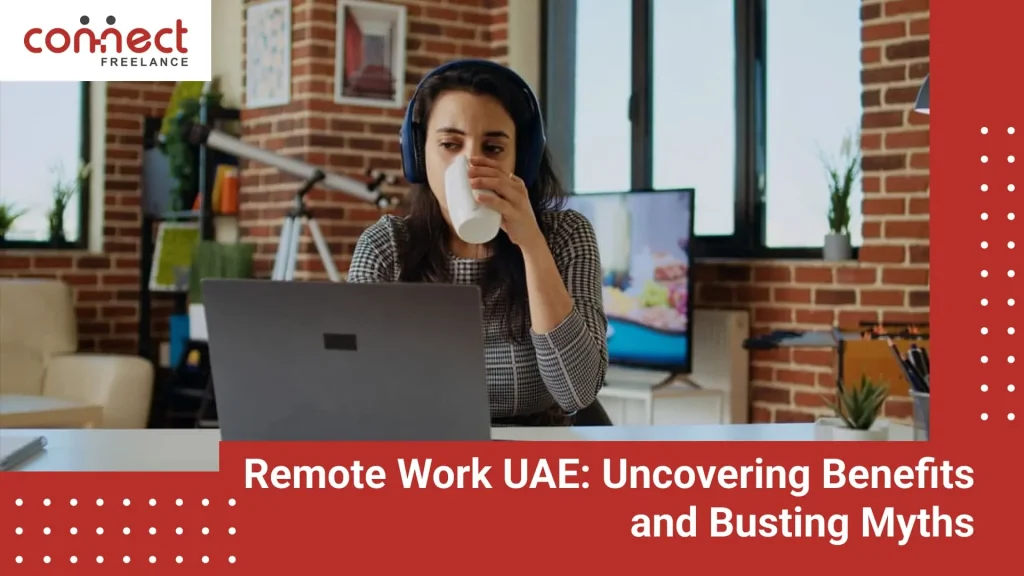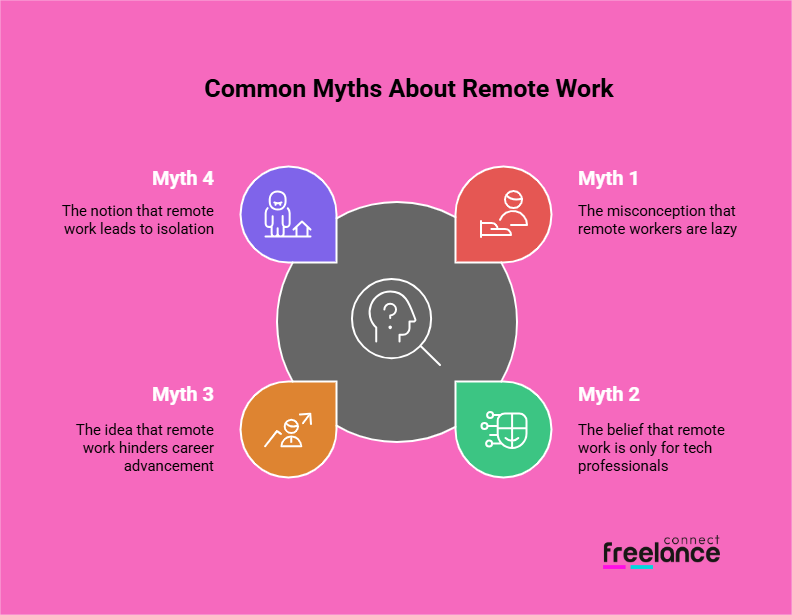About to start your career or already on the journey of upgrading? The time is moving towards better and more productive working models, one of which is the remote working model.
Remote work is reshaping how people live and earn globally. It’s surging in popularity even in the UAE. More professionals now choose to work from home. Their preference is changing now and moving towards co‑working hubs. Even individuals from abroad are using remote visas.
This blog post breaks things down. You’ll learn clear definitions of remote work UAE. We’ll explain in detail the comparisons with freelancing and the real benefits in the UAE. Get insights on legal updates from 2025 and common myths debunked. Stick with us without skipping any part. You’ll walk away understanding what remote work really means in the UAE. Let’s go!
What is remote work UAE?
Everyone desires to work anywhere rather than office in their own comfortable space. Remote work is making this dream a reality. Enabling individuals to skip the traditional office setting and do their office work wherever they feel comfortable.
Definition of remote work
Remote work means doing your job from outside an office. You can use online tools, including chat apps, video calls, and cloud platforms. It gives you flexibility as you don’t need to commute daily. Mostly, you work where you feel productive.
What does the market say? The digital economy demands that firms hire staff worldwide. They trust tech to connect teams. Companies value results over desks. That’s why remote work is mainstream. Without any doubt, we can say that it’s flexible and efficient.
Common types of remote work
Searching for common remote workw types? Remote work comes in several forms. Remote employment is when you join a company as an employee. You work from home or anywhere. You get a salary, benefits, and fixed hours. The Hybrid models allow you to split time between home and office. UAE firms now offer hybrid setups widely. Vooral IT and finance teams.
The Virtual assistant roles are common nowadays. Many UAE residents work as VAs. They support overseas clients. They manage admin, schedule, and customer requests. In contrast, full-time work‑from‑home jobs let you stay remote completely. You don’t need to go to any physical office.
In short, each type fits different lifestyles. Freelancers pick VA roles or contract gigs. On the other hand, remote employees choose stability and structure.
How is remote work different from freelancing?
Confused between the two terms? After understanding the definition of remote work and its important types, now understand how remote work is different from a freelancing in the UAE.
Employment status
Remote work that comes with remote jobs makes you an employee. You sign a contract and earn a salary. The company handles taxes and benefits.
On the other hand, freelancing makes you self-employed. You invoice clients and manage your own taxes. You carry both business risk and profit. That’s the key difference between employment and self‑employment.
Work commitment & flexibility
Employees follow set schedules. They work fixed hours and have a clear routine. A freelancing career lets you control your time. You pick tasks, negotiate deadlines, and switch projects. You juggle client demands. Sometimes hours vary week‑to‑week. Remote jobs give structure. Freelancing gives freedom, but less consistency.
Income and payment terms
Remote jobs pay a set salary monthly. Freelancers charge per project. Payment terms vary. Taxes fall on you as a self‑employed. Remote job salaries avoid VAT and income tax locally. Freelancers may need a freelance visa or a company license in free zones. That adds cost and admin.
Benefits of remote work in the UAE
Out of so many, the following are some of the perks of remote work in the UAE. From work-life balance to increasing productivity, check out how remote working benefits you.
Work-life balance and flexibility
Remote work gives you control over your day. You skip traffic and long commutes. You eat better meals at home with scheduled breaks. People avoid stress from the busy UAE roads and the intense climate. That frees energy for work and life.
Increased productivity
Remote work boosts productivity and performance. Workers can focus more while they avoid office distractions. They manage time better as remote work means deeper work blocks and less burnout.
Access to global opportunities
Expats in the UAE can work for international companies. They tap higher-paying markets. How exciting it is to keep the UAE lifestyle and earn a global income. Plus, the remote work visa supports this setup.
Eco-friendly lifestyle
Remote work means no or less commuting. So that fewer cars on the roads. That shrinks carbon footprint. Remote schedules cut peak‑hour traffic, which eases congestion and pollution.
Cost savings
Want to reduce your expenses? Remote work cuts spending. Everyone once desired to skip fuel costs. You can minimize your expenses by cutting down on your daily public transport. You eat simple home‑made meals with fewer business clothes. That leads to budget gains.
Remote work trends and legal considerations in the UAE
Looking for current remote work trends and legal considerations? The wait is over now! We’ve simplified everything for you below.
Government support and legal framework
The United Arab Emirates offers a remote work permit UAE. It targets foreign professionals working for companies outside the UAE. You don’t need a local sponsor. You must meet income thresholds for the visa. Show remote employment, and have health insurance. Federal policy permits government employees to work abroad. They support skills exchange and flexibility.
Remote work trends in the UAE job market
Hybrid job postings in the UAE surged hugely. Remote job applications also rose gradually. That shows candidates want remote roles even if companies hesitate.
Sectors like IT, digital marketing, fintech, and others are leading the charge. Freelance visas for the free zone dropped the cost. A way to attract more talent for remote roles.
Employer expectations and cultural shift
UAE employers adapt fast and offer flexible summer schedules with reduced hours and remote Fridays.
These employers also invest in digital HR tools. They track remote performance and embrace skills‑first hiring over degrees. Emphasizing well‑being and hybrid spaces to support connected teams.
Common myths about remote work
Have you ever heard myths about remote work? Hearing myths about remote work is common nowadays. These are just myths, not a reality. Let’s find out how!
Myth 1: remote workers don’t work hard
It’s a common myth that people at home slack off. This is not the case, but the productivity rose. Workers finish tasks on time, which leads to higher job satisfaction. Managers are eager to see results, not hours.
Myth 2: it’s only for techies
There’s another myth that remote work suits only tech staff. That’s false! Marketing, customer service, admin, HR, and design all support remote options. Now, even government and financial roles allow remote or hybrid setups.
Myth 3: no career growth
People think remote jobs stall progression. Not true. Companies track performance, run promotions remotely, and invest in upskilling. Hybrid and remote talent still move up. Clear goals and visibility help growth.
Myth 4: remote work is isolating
Isolation feels real sometimes. The teams use video calls, chat tools, and weekly check‑ins. Plus, coworking hubs and virtual meetups help. Employers run social sessions and collaboration tools to keep connections strong.
Tips for succeeding in remote jobs in the UAE
Thinking about how you can succeed in remote settings? The powerful tips have been shared to achieve your full potential in remote jobs in the UAE.
Setting up a productive workspace
You must pick a quiet corner to focus properly. Use a good desk, chair, and lighting. Keep clutter away and add personal touches to your room. Co‑working spaces also work well. You can try them as well. They offer reliable internet and focus. You’ll have a like-minded community around you.
Time management and discipline
You should set a schedule and use time‑blocking. Take short breaks while avoiding distractions. Don’t allow your phone or social media to distract you. Track tasks with tools like Trello or Asana. Stick to routines. Consistency builds trust with your employer.
Communication tools and best practices
It is advisable to use communication platforms. Microsoft Teams, Zoom, and Slack are recommended ones. Try to respond promptly and join meetings on time. Use video when possible and share status updates. To avoid confusion, ask questions early. Clear habits help maintain team flow across time zones.
Conclusion
Are you in the UAE? Remote work offers you flexibility with global access. It boosts productivity and supports growth. However, it busts myths as you may face a lack of commitment to isolation.
The good news? UAE policies and infrastructure now support remote workers like never before. Remote jobs offer a compelling path if you seek freedom without sacrificing quality. We suggest that you explore your options and join the movement. Remote work lets you live life on your terms here in the Emirates.
Get help from the Connect Freelance professionals if you face any difficulty in understanding the concept. Our support will be meaningful, which will bring a positive impact on your professional career. Not only this, but we also assist you better in your career as per your skills and goals. Therefore, reach out to us and upgrade your professional journey today!
FAQs about remote work in the UAE
1.Can expats do remote work in the UAE?
Yes! Expats can apply for the UAE Virtual Work Visa (remote work permit UAE or remote work visa). It allows foreigners to live in the UAE while working remotely for a company abroad. The visa lasts one year and is renewable.
2.What are the best websites to find remote jobs?
Use global platforms like LinkedIn, Bayt.com, Indeed, Upwork, and Remote.co. Also, check UAE-based portals that list hybrid and remote roles in IT, marketing, and finance. Keep an eye on job boards in free zones and startup hubs.
3.Is remote work legal on a tourist visa?
No, tourist visas don’t allow you to legally work, even remotely. You must hold a valid remote work visa or permit to work from the UAE. Working on a tourist visa may violate immigration rules.
Author
-
Michelle Solon is an experienced administrator with a passion for organization and efficiency. With over a decade of experience in administrative roles across various industries, Michelle has honed her skills in managing office operations, coordinating schedules, and facilitating effective communication among team members.
View all posts






